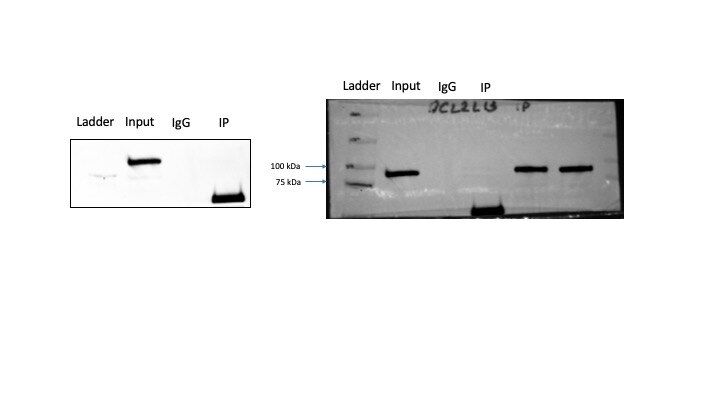- Featured Product
- KD/KO Validated
BCL2L13 Polyclonal antibody
BCL2L13 Polyclonal Antibody for WB, IP, IHC, ELISA
Host / Isotype
Rabbit / IgG
Reactivity
human, mouse, rat
Applications
WB, IP, IF, IHC, ELISA
Conjugate
Unconjugated
Cat no : 16612-1-AP
Synonyms
Validation Data Gallery
Tested Applications
| Positive WB detected in | HeLa cells, mouse heart tissue, HepG2 cells, rat heart tissue |
| Positive IP detected in | mouse heart tissue |
| Positive IHC detected in | human pancreas cancer tissue Note: suggested antigen retrieval with TE buffer pH 9.0; (*) Alternatively, antigen retrieval may be performed with citrate buffer pH 6.0 |
Recommended dilution
| Application | Dilution |
|---|---|
| Western Blot (WB) | WB : 1:1000-1:6000 |
| Immunoprecipitation (IP) | IP : 0.5-4.0 ug for 1.0-3.0 mg of total protein lysate |
| Immunohistochemistry (IHC) | IHC : 1:50-1:500 |
| It is recommended that this reagent should be titrated in each testing system to obtain optimal results. | |
| Sample-dependent, Check data in validation data gallery. | |
Published Applications
| KD/KO | See 5 publications below |
| WB | See 14 publications below |
| IHC | See 5 publications below |
| IF | See 3 publications below |
Product Information
16612-1-AP targets BCL2L13 in WB, IP, IF, IHC, ELISA applications and shows reactivity with human, mouse, rat samples.
| Tested Reactivity | human, mouse, rat |
| Cited Reactivity | human, mouse, rat |
| Host / Isotype | Rabbit / IgG |
| Class | Polyclonal |
| Type | Antibody |
| Immunogen | BCL2L13 fusion protein Ag9841 |
| Full Name | BCL2-like 13 (apoptosis facilitator) |
| Calculated Molecular Weight | 485 aa, 53 kDa |
| Observed Molecular Weight | 85 kDa |
| GenBank Accession Number | BC003032 |
| Gene Symbol | BCL2L13 |
| Gene ID (NCBI) | 23786 |
| RRID | AB_1850928 |
| Conjugate | Unconjugated |
| Form | Liquid |
| Purification Method | Antigen affinity purification |
| Storage Buffer | PBS with 0.02% sodium azide and 50% glycerol pH 7.3. |
| Storage Conditions | Store at -20°C. Stable for one year after shipment. Aliquoting is unnecessary for -20oC storage. 20ul sizes contain 0.1% BSA. |
Background Information
BCL2L13/MIL1 gene encodes a mitochondrially-localized protein with conserved B-cell lymphoma 2 homology motifs. BLC2L13 gene is highest expressed in heart, placenta and pancreas. The encoded protein Bcl-rambo may promote the activation of caspase-3 and apoptosis. The Bcl-rambo cell death activity was induced by its membrane-anchored C-terminal domain and not by the Bcl-2 homology region (PMID: 11262395). Multivariate analysis demonstrated that high expression of BCL2L13 was an independent prognostic factor for in childhood acute lymphoblastic leukemia (PMID: 20109966).
Protocols
| Product Specific Protocols | |
|---|---|
| WB protocol for BCL2L13 antibody 16612-1-AP | Download protocol |
| IHC protocol for BCL2L13 antibody 16612-1-AP | Download protocol |
| IP protocol for BCL2L13 antibody 16612-1-AP | Download protocol |
| Standard Protocols | |
|---|---|
| Click here to view our Standard Protocols |
Publications
| Species | Application | Title |
|---|---|---|
Cancer Commun (Lond) Glucose-mediated mitochondrial reprogramming by cholesterol export at TM4SF5-enriched mitochondria-lysosome contact sites | ||
Nat Commun Bcl-2-like protein 13 is a mammalian Atg32 homologue that mediates mitophagy and mitochondrial fragmentation. | ||
Autophagy BNIP3L/Nix-induced mitochondrial fission, mitophagy, and impaired myocyte glucose uptake are abrogated by PRKA/PKA phosphorylation. | ||
Proc Natl Acad Sci U S A Bcl2L13 is a ceramide synthase inhibitor in glioblastoma.
| ||
Reviews
The reviews below have been submitted by verified Proteintech customers who received an incentive for providing their feedback.
FH Melissa (Verified Customer) (07-28-2022) | Antibody worked well in western blot. Lysate used was from Huh7 cells IP-ed for a different target protein.
 |






